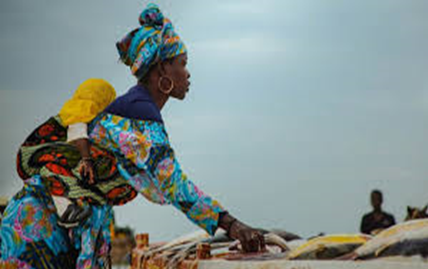
In the area where I grew up, I remember that most of my grandmother’s friends who were mainly mates at church and in social associations were working at small-scale informal businesses. When my grandma sent me to the market, I usually became excited since every woman sitting in the market invited me with some fruits from their sale. Exceedingly, I always got fascinated to see them gathered in the same place. Likewise, among our relatives who were residing in the rural areas, it was women who used to come to the market more often than men.
I was questioning my grandma, who has always been a reliable and brilliant one and whom I have ever known to answer any of my questions in the world.
She answered me, “They work in the market to cover their household costs which are the concerns of the woman rather than the man. He is not expected to worry about inputs needed for the kitchen.
I was too conscious of critically following up on things. I realized that children were mostly asking their mothers for school materials. The basic role of the husband is to buy sheep or goats during holidays. Other routine costs are left to be covered by the woman.
Thus, what did this mean if this woman is going to be enhanced on the level she is already doing this business, is these days crucial point. This idea is becoming the point of discussion at the continent level since the above-mentioned fact is the prevailing truth across countries of Africa.
Therefore, assumptions, research works, and panels have been produced on the topic. The continent and the world are admitting the necessity of women’s inclusion in the economic sector for sustainable development. Policies and procedures are frequently drafted and to some extent implemented on the point.
Current statistics show that African women constitute 51% of the population. That means more than half of the people are women. These women are not taking the equivalent seat on critical issues like the economy. As the African Development 2015 report showed, “Women are more active as economic agents in Africa than anyone else in the world.”
Here two points are visible. The first one is that women are very active agents in the economy more than their male counterparts. Second, African women are more active than those from other continents. Thus, involving women in the economic sector did mean a lot for the continent is a logical point to be made. Further, convincing facts were raised at the conference which was organized by the Wilson Center. At the conference, representatives of international organizations who work in business were speakers on the stage. Research which was done by BS members on the relevance of empowering African women economically was also presented.
As the moderator of the conference asserted based on unswerving sources, African women perform the majority of activities and in some countries, the figure makes up to 70% of the workforce across the formal and informal sectors. She added that women play a pivotal role in the well-being of their families.
According to the 2015 African Union report, gender inequality in economic growth has affected the continent’s development. Women were denied from participating in the economic growth to their fullest potential. Thus, the underdeveloped and the poorest sections of society are principally women, which mean more than half of the population stays underdeveloped.
At the conference, research work was presented by Widow Chester (Manager at Business for Social Responsibility social responsibility BS).
In the presentation, the meaning of the phrase, ‘women empowerment’ was defined based on the International Center for Research on Women. According to the definition, women’s economic empowerment is, when she can succeed and advance economically and have the power to make an act on economic decisions.”
The research finding identified three barriers that African women are facing when they attempt to economic empowerment. The first one is women in Africa are economically active through agriculture and trade pursuits but they tend to be constrained in the formal labor force. This means that though women are effective in performing more jobs, they are kept at the peripheral, and stay away from crucial positions.
They are only assigned to take over labor works that incurred the lowest pay and demanded exhaustive labor efforts. As the research found out, this trend had obliged the continent to miss 95 billion USD to be generated from the economic sector due to gender inequality in Africa.
The second barrier that pushed back African women from economic empowerment is that women are not given the same rights and benefits as men. But they are contributing a significant amount to economic activity. Therefore; much of their potential is lost.
In a society like Africa where patriarchy and underdevelopment are immensely affecting women, the major challenge that damages their psychological and financial set up of them is unfair treatment. Males are already recognized to take positions. When women get into a space with males, the favor always tends toward males. Rights are fair in the situation of males but obligations are bolded when it comes to females. In Africa, the right to own land and wealth is dominantly forbidden for females. It is the male who is entitled to inherit the land and own it. Thus, women are forced to rely on males for living. Here, the logic that the globe equally verbalizes is that women’s economic empowerment is crucial for creating a more inclusive and productive economy that everyone benefits from.
The third one is that African women face greater educational barriers, and carry heavier social burdens than their male counterparts. In the continent, the number of girls in high schools and higher institutions is below half percent. A huge number of females are out of any form of education. This compels them to stay away from any competitive positions. They are forced to take over social responsibilities and confined to household chores only. In addition to that, they don’t know how to lead their family in the right way. They can’t be models for their children. They are also neglected from any form of innovation and technological platforms.
In the research, the conductors have identified three important building blocks.
1.Safe and equitable employment opportunities should be planted in the continent to empower women economically. In the continent, the dominant women are unemployed, self-employed or they are forced to work informally. This has a greater effect on the health and well-being of the family. Though they had the potential and need to work more and contribute to their family and the continent too, the abusive working environment, gender bias, and gender discrimination did make them dependent on their family. This enlarges to the community level and country-wide. This, in the long run, can drag the continent back.
2.There should be a safe environment that secures social protection and child care. This idea is forwarded based on the research that showed that in Africa, employed women are suffering from insufficient maternity leave. This has its own impact on pushing her to cease her job or it affects the born baby to miss his mam in its early age while it is a period that he needs her more than anything ever. Even daycares are not efficient. There is a problem as inspected in the research. There is a shortage of appropriate accommodation and nursing accessibility. These cumulative challenges prevent the woman from sticking to her work and being competitive with her male counterpart.
3.Inclusive and accessible education and training should be expanded in the continent. There is a saying that I believe, emanates from the practical reality of the African socialization status. That is ‘teaching a woman is teaching a society’’. This sounds much more like women are more attached to their children and society than males. Thus, teaching a woman has a greater impact on reducing the intergenerational poverty rate. An educated woman can be able to compete in any sphere with males. She can develop the knowledge, efficiency efficacy, and confidence to pass through challenges she may experience in the track of any leadership position. An educated woman can stay as an inspiring instance for her children and help them succeed in their studies. Thus, accommodating women in education is decisive for effective competition for herself and the community too. An educated woman knows how to achieve success since she can handle things easily and can adapt technologies easily in business.
The research that was appreciated at the conference in bringing the facts of the African women with tangible data was concluded by suggesting recommendations. The presenter had forwarded three recommendations.
The first suggestion was forwarded to those institutions that focus on business. These institutions are recommended to create gender-sensitive workplaces and benefits. African women are still the abused sections of society. Thus to foster gender equality, securing basic workplaces be sensitive to gender is the best measure that can bring a change in gender-based violence. Till gender-based treatments are fully eliminated, special concerns for women, I believe, need to be the primary targets of those institutions that aim at making business.
Since males are socially approved and recognized sections of society, they are taking any benefits in business areas. Thus, women are lagging back financially and psychologically. This needs to be changed. Women need to be equally considered as per their merit. Sex shouldn’t be the criteria for any favor made by institutions and organizations.
The second recommendation is training. Training needs to be given on leadership for the advancement of women’s empowerment in Africa. African women face cultural and structural barriers when they dream to advancing themselves economically. Thus, women needed to be promoted to take positions in the economic sectors. Supportive mentors should be given to encourage women to join economic spheres. Greater care should also be given in the recruitment process in this sector.
The third one is entrepreneurship and business linkages that focus on women should be fostered. Women have been facing various challenges. Thus, institutions and concerned bodies need to work on enabling women to be effective in creating jobs and linking with others. They need to be directed and situations should be made good for them to create good relations with others.
BY MEKDES TAYE (PhD)
THE ETHIOPIAN HERALD THURSDAY 22 AUGUST 2024





